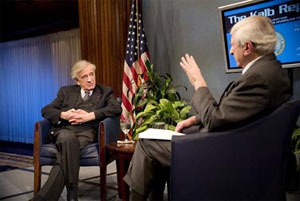|
December 2006
Insights from Elie Wiesel on Kalb Report

Elie Wiesel and Marvin Kalb on the Nov. 20 Kalb Report. |
By Zak M. Salih
Witty, concerned, and passionate, Nobel Peace Prize-winner Elie Wiesel joined journalist and scholar Marvin Kalb for a one-on-one interview at the 54th forum of The Kalb Report, GW’s award-winning broadcast series. This was Wiesel’s second appearance on the program.
Drawing the largest crowd ever for a Kalb Report, the standing-room-only Nov. 20 forum at the National Press Club focused on the Bible, the Iraq war, and the media as well as intense international situations, such as the Palestinian homeland issue and anti-Semitic rhetoric by Iranian President Mahmoud Ahmadinejad.
Introduced by Kalb as a rare example of a man who represents “the collective conscience of the world,” Wiesel reflected on the foundation of his religious beliefs. A Holocaust survivor, Wiesel said the trauma of that experience wounded his faith and caused his belief in God and humanity to waver.
“Medically, we should have lost our sanity,” he said in reference to Holocaust survivors. Wiesel sought solace in religious studies, but eventually suffered a long period of crisis that tested the strength of his devout faith. “I never lost faith in God,” he said. “The tragedy of the believer is much more profound than the tragedy of the nonbeliever.”
Nevertheless, it is Wiesel’s optimism in the face of such personal anguish that earned him the Nobel Peace Prize and increasing international influence.
In February 2003, Wiesel counseled President Bush on the ultimately inaccurate information about weapons of mass destruction in Iraq. Though he supported international intervention to quell a potential threat to world peace, he characterized the current situation as “a mess.”
“We must think morally,” he said, suggesting that the United States should appeal to its allies and other world leaders for advice and support to improve the situation in Iraq. Wiesel sketched out his plan for American withdrawal from Iraq, which would involve President Bush visiting traditional U.S. allies to ask for their assistance in vastly increasing the troop presence in Iraq for one year. The goal would be to create a stable government in Iraq within that year, then withdraw all troops.
Regarding the Middle East peace process, Wiesel remains hopeful that an agreement between Israelis and Palestinians will occur. Crucial to this idea, he said, is including Islam in the global dialogue between Christianity and Judaism.
“I am convinced there will be peace in this lifetime,” he stressed. “There must be a future like that…it cannot go on like this.”
Stressing that indifference during crisis should not be an option, Wiesel said, “The history of one people is part of the collective history of the world. Whenever one people, one nation, one community is targeted, all others are affected by it.”
When asked by Kalb whether he had ever considered politics, Wiesel said he isn’t drawn to the power of the profession and that his own strength stems from a simpler source, which he called “my words—just a few words.”
The Kalb Report series is produced by GW, the Joan Shorenstein Center on the Press, Politics, and Public Policy at Harvard University, and the National Press Club. Established in 1994, the series is underwritten by a grant from the Ethics and Excellence in Journalism Foundation.
Send feedback to: bygeorge@gwu.edu
|
|

|

